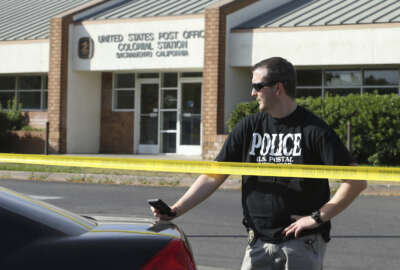Hubbard Radio Washington DC, LLC. All rights reserved. This website is not intended for users located within the European Economic Area.
Joint Chiefs argue against National Guard representation
For the first time in the memory of any currently-serving member of the Senate Armed Services Committee, all six members of the Joint Chiefs of Staff testified ...
wfedstaff | June 4, 2015 1:51 pm
The Joint Chiefs of Staff made a show of force on Capitol Hill Thursday, with all six members telling Congress they should reject legislation that would make the head of the National Guard formal recognition as one of their peers.
Each of the generals and admirals went to great lengths to praise the service of the Army and Air National Guard, particularly over the last 10 years of war. But they were unanimous in arguing that giving the chief of the National Guard Bureau full membership in the Joint Chiefs is a bad idea.
Gen. Martin Dempsey, the Joint Chiefs chairman, said rather than giving the National Guard greater stature, the proposal could auger against hard work that’s already been done to make the Guard a full partner in the total force. 
Dempsey and the other members of the Joint Chiefs argued the National Guard already is represented at the table: the Air National Guard by the Air Force Chief of Staff, and the Army National Guard by the Army Chief of Staff. Dempsey also suggested the addition of the National Guard chief would undermine the principle of civilian control of the military.
“Each of the Joint Chiefs is subject to the civilian oversight of a single appointed and confirmed Secretary. The Chief of the National Guard Bureau has no such oversight,” he said. “Elevation to the JCS would make him equal to the service chiefs without commensurate accountability. This proposal runs counter to the carefully-crafted organizational and advisory principals established in the Goldwater-Nichols legislation.”
Different role
The chiefs also argued the role of the National Guard Bureau is fundamentally different from the chiefs of the military services. Under the umbrella of the National Guard are soldiers and airmen who are sometimes serving under state authority and are sometimes federalized, and treating that unique mix of two roles from two military services as though it were one entity would be inappropriate.
Adm. James Winnefeld, the vice chairman of the Joint Chiefs, said the proposal would bifurcate services that are seen today as one Army and one Air Force.
“Despite being my great friend, the Chief of the National Guard Bureau does not have commensurate responsibility, nor should we send the corrosive signal that we have two different United States Armies and two United States Air Forces,” Winnefeld said. “Second, while the legislation may send a positive message to the terrific men and women in the Guard, I’m concerned that it will send a very negative message to the remaining 40-plus percent of our nation’s reserve component that they are somehow of lesser importance, and that future decisions could be taken at their expense. And I’ve heard that concern from members of our Title 10 reserve components whom I’ve asked.”
The chiefs say the National Guard chief already has a role in the deliberations of the Joint Chiefs, though it’s informal, and it’s at the invitation of the chairman. 
“I believe it needs to be institutionalized,” he said.
Role of advisor under law
Under current law, the National Guard bureau chief has the responsibility to advise the Secretary of Defense and the Army and Air Force chiefs about National Guard matters. But McKinley said the Guard needs a direct and statutory pipeline to the Chairman of the Joint Chiefs and to the National Security Council–something it would only get as a full member of the Joint Chiefs.
“I don’t have an institutional position from which I can advise the President, the NSC, the Homeland Security Council and Congress on non-federalized National Guard forces that are critical to homeland defense and civil support missions,” McKinley said. “Adding the Chief of the National Guard Bureau to the JCS, in my opinion, would ensure that in the post-9/11 security environment, the National Guard’s non-federalized role these missions will be fully represented in all JCS deliberations.”
Though McKinley was the only panelist invited to testify in favor of the National Guard proposal, he found an ally at the hearing in Sen. Lindsey Graham (R-S.C.), an Air Force reservist.
“If you believe the nation is threatened by national disasters, and the front-line uniformed force is the National Guard, I would like to have you sitting there, and not by invitation by the way,” Graham told McKinley.”
Graham asked Dempsey, “If you got [mad] at him, couldn’t you just tell him to get out of the room?”
“Yes, I could,” Dempsey responded.
“At the end of the day, I think you need to be in the room with some weight behind you,” Graham said. “I’m here to tell everybody the citizen-soldier’s time has come. You’re going to get a seat at the table if I get anything to say about it. The first shot was fired by a citizen-soldier, and it’s time for the citizen-soldier to be sitting at the table, not just for political reasons, but for substantive reasons.”
Goldwater-Nichols revisited?
To Graham, the uniform resistance from the existing chiefs has echoes of the past. He pointed out the chiefs were vehemently against the Goldwater-Nichols reorganization of the military in 1986, and were against adding the Marine Corps to the panel in the 1970s. 
But Sen. Jim Webb (D-Va.), who served as the assistant secretary of defense in charge of Reserve and National Guard affairs during the Reagan administration, sided with the chiefs.
He agreed, the guard already is represented.
“I think that anyone who is saying that citizen-soldiers are not at the table is being unnecessarily divisive,” he said. “I think it’s unfair to the stewardship of the Army and the Air Force. I don’t think they’ve been failing to represent the interests of the Army Guard in the Army, or the Air Guard in the Air Force.”
Though Senate Armed Services Committee members appeared to be split or noncommittal to the proposal at Thursday’s hearing, the idea does seem for now to have enough support in the overall Senate to pass with 66 senators willing to back the effort, and similar legislation already has passed the House.
This story is part of Federal News Radio’s daily DoD Report. For more defense news, click here.
RELATED STORIES:
Analysis: National Guard has earned Joint Chiefs slot
Dempsey advises against adding National Guard to Joint Chiefs
Copyright © 2024 Federal News Network. All rights reserved. This website is not intended for users located within the European Economic Area.
Jared Serbu
Jared Serbu is deputy editor of Federal News Network and reports on the Defense Department’s contracting, legislative, workforce and IT issues.
Follow @jserbuWFED
Related Topics





